人教版英语九年级第五单元知识点总结
人教版九年级英语unit5知识点总结

人教版九年级英语unit5知识点总结Unit 5 is an important unit in the ninth-grade English textbook published by People's Education Press. In this unit, students are exposed to various knowledge points related to the use of tenses, vocabulary, and grammar structures. This article aims to provide a comprehensive summary of the key points covered in Unit 5 without delving into any political issues.1. Present perfect tense:The present perfect tense is formed by using "have/has + past participle" and is primarily used to describe actions that took place in the past but have a connection to the present. This tense is commonly used when referring to past experiences, completed actions with a result in the present, and actions that happened in an unspecified past time.2. Present perfect tense with for/since:When using the present perfect tense with for or since, we highlight the duration of time that an action has been happening. "For" is used to express the length of time, while "since" indicates the starting point of the action.3. Use of until/ up till now:The words "until" and "up till now" are often used in conjunction with the present perfect tense to indicate actions or situations that have been ongoing until the present moment.4. Past perfect tense:The past perfect tense, formed by using "had + past participle," is used to describe an action that happened before another action in the past. This tense is essential for expressing the sequence of events in a narrative.5. Vocabulary related to personal experiences:Unit 5 introduces a range of vocabulary words related to personal experiences, such as achievements, challenges, memories, and aspirations. Students are encouraged to expand their vocabulary by actively using these words in speaking and writing exercises.6. Comparative and superlative forms of adjectives and adverbs:Students should be familiar with the rules for forming comparative and superlative degrees of adjectives and adverbs. Regular adjectives can take the suffixes "-er" and "-est" respectively, while irregular adjectives have their unique forms, such as "good, better, best."7. The use of "so... that" and "such... that":"So... that" and "such... that" are used to express a cause-effect relationship between two clauses. "So" is used with adjectives or adverbs in the second clause, while "such" is followed by a noun phrase.8. Modal verbs for giving advice and suggestions:Unit 5 also covers the usage of modal verbs like "should," "ought to," and "had better" to give advice or make suggestions. These modal verbs offer different levels of suggestion and are commonly used in everyday language.In conclusion, Unit 5 of the ninth-grade English textbook published by People's Education Press covers a wide range of knowledge points. Understanding the correct usage of tenses, vocabulary, and grammar structures is crucial for students' language proficiency. By grasping these key points, students can enhance their speaking, writing, and comprehension skills in English.。
Unit5笔记人教版英语九年级全册

Unit 5知识梳理总结【词汇梳理】coin(n.硬币)→Every coin has two sides. 凡事都有两面性。
glass(n.玻璃,不可数名词)→glasses(pl. 玻璃杯,可数名词)→a glass of milk一杯牛奶→a pair of glasses一副眼镜produce(v.生产;制造)→ product (n. 产品;制品)→ production (n. 生产)wide(adj.宽的)→ widely (adv. 广泛地;普遍地)→width(n.宽度;广度)France(法国)→ French (adj. 法国的;法国人的)boss(n.老板;上司)→ bosses (pl.)leaf(n.叶;叶子)→ leaves (pl.)grass(n.草地;草坪)→keep off the grass勿踏草坪Germany(n.德国)→ German (adj. 德国的;德语的;n. 德语;德国人)→ Germans (pl.)plete (v.完成)→pletely (adv.)form(n.形式;类型;使形成)→form a good habit养成好习惯fair(n.展览会;交易会)→(adj.公平的)→unfair( 反义adj.不公平的)【短语归纳】be made of... 由.....制成(能看出原材料)be made from... 由.....制成(看不出原材料)be made in... 在......制造be known /famous/wellknown for... 以......闻名be known /famous/wellknown as... 作为......而出名be known /famous/wellknown to... 为......所熟知as far as I know据我所知by hand手工avoid doing sth. 避免做某事no matter无论find out查明;弄清turn...into...将......变成......send out发送;发出be covered with覆盖着paper cutting剪纸【考点总结】1.be famous for,be famous as, be famous to①be famous for... 意为“因......而闻名”,后接原因,通常是名词。
人教版九年级英语第五单元知识点梳理

人教版九年级英语第五单元知识点梳理Unit 5 What are the shirts made of?一、短语:1.everyday things日常用品2.be made in在……制造3.environmental protection环境保护4.be famous for以……而著名5.be produced in在……生产6.be known for以……闻名7.as far as I know据我所知8.pick by hand手工采摘9.send for发送10.avoid doing sth避免做某事二、知识点:1.made of:由……制(构)成,后接构成某物质的原料。
例:This skirt is made of silk.这件裙子是用丝绸制成的。
be made of/from/up of的区别:(1)be made of表示制成成品后,仍可看出原材料是什么。
保留原材料的质和形状,制作过程仅发生物理变化。
例:The kite is made of paper.风筝是用纸做的。
(2)be made from表示制成的东西完全失去了原材料的外形或特征,或原材料在制作过程中发生化学变化,在成品中已无法辨认。
例:The paper is made from wood.纸是木头做的。
Butter is made from milk.黄油是从牛奶中提炼出来的。
(3)be made up of表示用……构成或组成的,指人、物皆可,指结构成分。
例:Our class is made up of six groups.我们班是由六个小组组成的。
2.No matter what you may buy,you might think those products were made in those countries.无论你买什么,你都可能认为那些产品是在那些国家生产的。
此句为由no matter+特殊疑问词引导的让步状语从句。
九年级英语第五单元知识点总结

九年级英语第五单元知识点总结一、重点单词1. belong- 用法:belong to sb. / sth.,表示“属于某人/某物”,无被动语态,也不用于进行时态。
例如:This book belongs to me.(这本书属于我。
)2. picnic- 相关短语:go for a picnic(去野餐);have a picnic(进行野餐)。
例如:We are going for a picnic this weekend.(我们这个周末打算去野餐。
)3. author4. hair band- 词义:发带。
例如:I found a hair band on the playground.(我在操场上发现了一个发带。
)5. possibly- 词性:副词,词义:可能地;也许。
例如:It may possibly rain tomorrow.(明天也许会下雨。
)6. drop- 用法:- 作动词,有“落下;掉下;使落下”等意思。
例如:He dropped his pen on the floor.(他把笔掉在地上了。
)- 还可表示“放弃(想法、计划等)”,例如:He dropped the idea of going abroad.(他放弃了出国的想法。
)- 相关短语:drop by(顺便访问);drop in on sb.(顺便拜访某人);drop off(减少;让……下车)。
7. symphony- 词义:交响乐;交响曲。
例如:Beethoven wrote many famous symphonies.(贝多芬写了许多著名的交响曲。
)8. optometrist- 词义:验光师;配镜师。
例如:You should go to an optometrist to check your eyesight.(你应该去验光师那里检查视力。
)9. appointment- 用法:make an appointment(预约);have an appointment(有约会)。
人教版英语九年级Unit5单词+课文+知识梳理
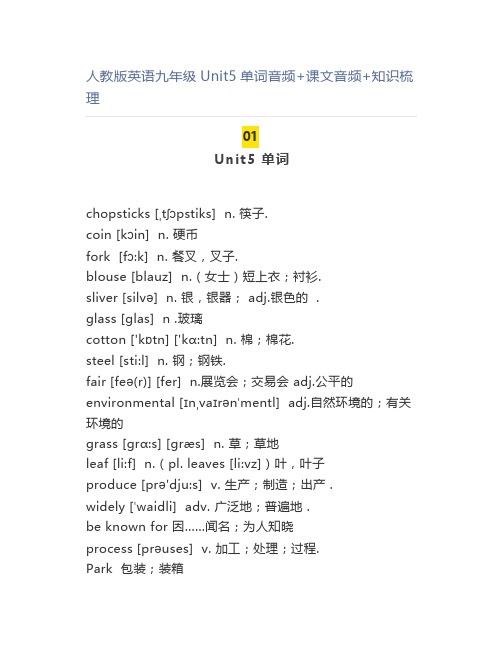
人教版英语九年级Unit5单词音频+课文音频+知识梳理01Unit5 单词chopsticks [ˌtʃɔpstiks] n. 筷子.coin [kɔin] n. 硬币fork [fɔ:k] n. 餐叉,叉子.blouse [blauz] n.(女士)短上衣;衬衫.sliver [silvə] n. 银,银器; adj.银色的 .glass [glas] n .玻璃cotton ['kɒtn] ['kɑ:tn] n. 棉;棉花.steel [sti:l] n. 钢;钢铁.fair [feə(r)] [fer] n.展览会;交易会 adj.公平的environmental [ɪnˌvaɪrənˈmentl] adj.自然环境的;有关环境的grass [ɡrɑ:s][ɡræs] n. 草;草地leaf [li:f] n.(pl. leaves [li:vz])叶,叶子produce [prə'dju:s] v. 生产;制造;出产 .widely [ˈwaidli] adv. 广泛地;普遍地 .be known for 因……闻名;为人知晓process [prəuses] v. 加工;处理;过程.Park 包装;装箱product [ˈprɒdʌkt][ˈprɑ:dʌkt] n. 产品;制品France [fra:ns], [fræns]法国 .no matter 不论;无论 .local [ˈləukl] adj. 当地的;本地的 .brand [brænd] n. 品牌;牌子avoid [əˈvɔid] v. 避免;回避 .handbag [ˈhændbæg] n. 小手提包mobile [ˈməubail] adj.可移动的;非固定的everyday ['evrideɪ] adj. 每天的;日常的boss [bɒs] [bɔ:s] n. 老板;上司Germany [ˈdʒə:(r)məni] n. 德国 .surface [sə:(r)fis] n. 表面;表层.material [məˈtiəriəl] n. 材料;原料 .traffic [ˈtræfɪk] n. 交通;路上行驶的车辆postman [ˈpəustmən] n. 邮递员 . cap [kæp] n(尤指有帽舌的)帽子glove [glʌv] n(分手指的)手套 .international [ˌintə(r) ˈnæʃnəl] adj. 国际的competitor [kəmˈpetitə(r)] n. 参赛者;竞争者its [its] adj. 它的form [fɔ:(r)m] n. 形式;类型clay [klei] n. 黏土;陶土celebration [ˌselɪˈbreɪʃn] n. 庆典;庆祝活动balloon [bəˈlu:n] n. 气球 .paper cutting 剪纸scissors [ˈsizə(r)z] n. (pl.) 剪刀lively [ˈlaivli] adj. 生气勃勃的;(色彩)鲜艳的fairy [ˈfeəri] [ˈferi] tale [teil] n 童话故事historical [hɪˈstɒrɪkl] adj.(有关)历史的heat [hi:t] n. 热;高温 v. 加热,变热polish [ˈpɒlɪʃ][ˈpɑ:lɪʃ] v. 磨光;修改;润色complete [kəmˈpli:t] v. 完成Korea [kəˈri:ə] 朝鲜;韩国Switzerland [switsə(r)lənd] 瑞士San Francisco [ˌsæn frənˈsiskəu] 圣弗朗西斯科(旧金山,美国城市)Marcus [ˈmɑ:kəs] n. 马库斯(男子名)Pam [pæm]帕姆(女名)02U n i t5课文03Unit5 知识梳理Unit 5 What are the shirts made of?【重点短语】1.be made of 由...制成的(表示制成成品后,仍可看出原材料是什么)2.be made from 由...制成的(在成品中已无法辨认原材料)3.be known for 以......闻名4.be used for 被用于......5.no matter 不论;无论6.be covered with 用...覆盖7.as far as I know 据我所知8.by hand 用手9.be good for 对……有益10.on the last friday of each month最后一个星期五11.be good at 擅长12.make high-technology products 制造高科技产品13.the earth’s surface 地球表面14.many different kinds of 许多不同种类的15.fly a kite 放风筝16.such as 例如17.according to 根据按照18.ask for help 请求帮助19.a symbol of ……的象征20.put…on… 把……放在……上21.be used for 被用于做……22.good luck 好运23.at a very high heat 在高温下24.be made in 在……制造的25.be famous for 以……著名26.on the sides of mountains 在山腰上27.traffic accident 交通事故28.a kite festival 风筝节29.be from 来自30.turn ……into ……把……变成……【重点句型】1. What are the shirts made of?衬衫是由什么制成的?2. It was made in Thailand.它是在泰国制造的。
人教版 英语九年级 Unit5 知识点总结
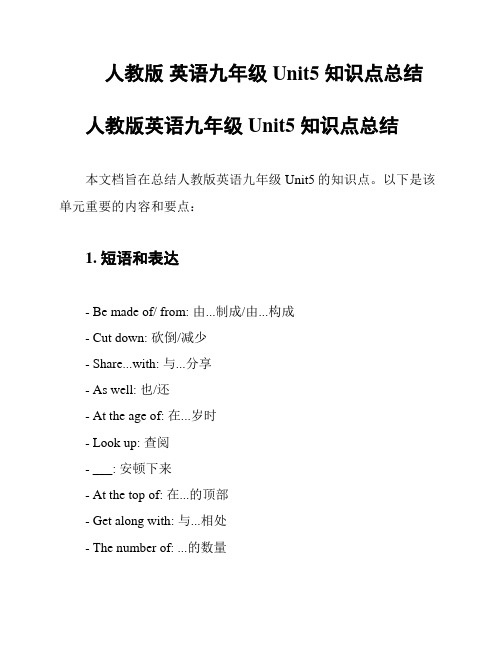
人教版英语九年级 Unit5 知识点总结人教版英语九年级 Unit5 知识点总结本文档旨在总结人教版英语九年级Unit5的知识点。
以下是该单元重要的内容和要点:1. 短语和表达- Be made of/ from: 由...制成/由...构成- Cut down: 砍倒/减少- Share...with: 与...分享- As well: 也/还- At the age of: 在...岁时- Look up: 查阅- ___: 安顿下来- At the top of: 在...的顶部- Get along with: 与...相处- The number of: ...的数量2. 句型和语法- 主语+ V-为-IO DO: 例如:___.(我给妈妈买了一件礼物。
)- There be句型: 例如:There is a big park near my house.(我家附近有一个大公园。
)- 状语从句: 例如:I will go swimming if it doesn't rain.(如果不下雨,我会去游泳。
)3. 词汇- Sweat: 汗水- Balanced: 均衡的- Environment: 环境- Admire: 钦佩- us: 好奇的- Basement: 地下室- Apartment: 公寓- Detector: 探测器- Forever: 永远- ___: 替换品请注意,以上内容仅为知识点总结,具体的例句、用法和解释请参考教材或额外的研究资料。
希望这份文档对您有所帮助!*文档字数:xxx字*。
人教版英语九年级第五单元知识点总结

人教版九年级英语第五单元知识点总结Unit 5 What are the shirts made of一.chopsticks /coin/ fork /blouse/ silver /glass/ cotton/ steel/ fair/ environmental /grass /leaf/ produce /widely /process /be known for/ pack/ product/ France/ no matter/ local/ brand/ avoid/ handbag/ mobile /everyday/ boss /Germany/ surface/ material/ traffic/ postman/ cap/ glove/ international/ competitor/ its /form/ clay /celebration/ balloon/ paper cutting /scissors lively /fairy/ historical/ heat/ polish /completeStudents clean the classroom every day.The classroom is cleaned by students every day.The classroom isn’t cleaned by students every dayIs the classroom cleaned by students every day?When is the classroom cleaned by students every day?二.1. produce v. 生产;制造produce、make和grow的用法1).produce 可以表示生产汽车、机器 produce cars生产汽车也可以表示生产粮食蔬菜 produce wheat生产小麦2).make 制造,主要指制造工业品 make cars制造汽车、飞机不能表示通过种植而获得的产品,不能说make wheat3).grow 主要指种植、栽培庄稼,农产品grow wheat种小麦Many of us knows how to ____tea, but few knows where tea trees are_____.A. make, madeB. grow, grownC. produce, madeD. make, grown根据题意可知,第一空“是怎样泡茶”make tea ;第二空是“种茶树”grow tea trees2. German Germans Germany3. lively1)live “活着的”,通常指物,不指人,常用来作定语放名词的前面。
人教版 英语九年级 Unit5 知识点整理
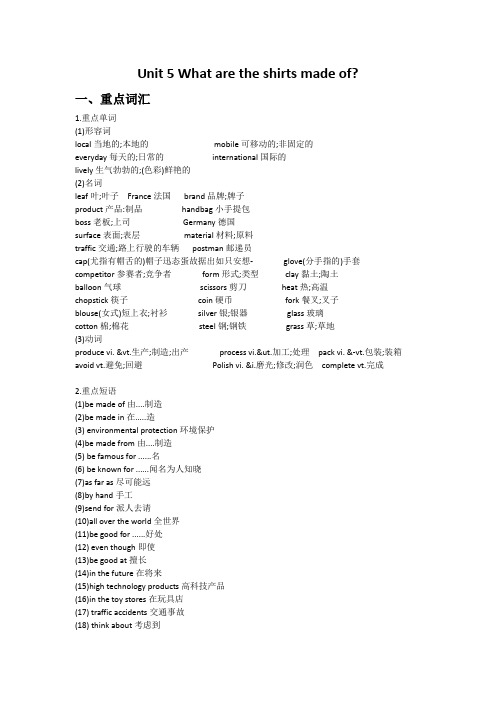
Unit 5 What are the shirts made of?一、重点词汇1.重点单词(1)形容词local当地的;本地的mobile可移动的;非固定的everyday每天的;日常的international国际的lively生气勃勃的;(色彩)鲜艳的(2)名词leaf叶;叶子France法国brand品牌;牌子product产品:制品handbag小手提包boss老板;上司Germany德国surface表面;表层material材料;原料traffic交通;路上行驶的车辆postman邮递员cap(尤指有帽舌的)帽子迅态蛋故据出如只安想- glove(分手指的)手套competitor参赛者;竞争者form形式;类型clay黏土;陶土balloon气球scissors剪刀heat热;高温chopstick筷子coin硬币fork餐叉;叉子blouse(女式)短上衣;衬衫silver银;银器glass玻璃cotton棉;棉花steel钢;钢铁grass草;草地(3)动词produce vi. &vt.生产;制造;出产process vi.&ut.加工;处理pack vi. &-vt.包装;装箱avoid vt.避免;回避Polish vi. &i.磨光;修改;润色complete vt.完成2.重点短语(1)be made of由....制造(2)be made in在.....造(3) environmental protection环境保护(4)be made from由....制造(5) be famous for ......名(6) be known for ......闻名为人知晓(7)as far as尽可能远(8)by hand手工(9)send for派人去请(10)all over the world全世界(11)be good for ......好处(12) even though即使(13)be good at擅长(14)in the future在将来(15)high technology products高科技产品(16)in the toy stores在玩具店(17) traffic accidents交通事故(18) think about考虑到(19)make a kite制作一个风筝(20)fly a kite放风筝(21)turn... into. ..把....变...(22)ask for help请求帮助(23)in trouble处于困境中(24)be covered with被...覆盖(25)rise into升到(26)fairy tale童话故事(27)no matter不论;无论(28) paper cutting剪纸(29) symbols of wishes祝愿的象征二、重要句型1. Is it made of silver?它是由银子制作的吗?(1)be made+介词短语Be made of是.....制成的。
人教版英语九年级 Unit5 重点知识归纳

Unit 5 知识清单Section A重点短语1.be made of 由…制成(看得见原材料)2.be made from由…制成(看不见原材料)2.environmental protection环境保护3.pay to do sth. 花钱做某事4.be widely known for 广为人知5.as far as I know 就我所知6. be picked by hand 手工挑选/采摘7. in many different areas在不同地区8. search for 寻找9. no matter 无论10. even though 即使11.be covered by 被….覆盖12. avoid doing sth. 避免做…. 13.high-technology products 高科技产品14 .the earth’s surface 地球表面15.cause traffic accidents 导致交通事故16.a pair of chopsticks 一双筷子17. a pair of gloves 一副手套18. A hundred percent cotton 纯棉19. attend for free 免费参加重点语法:被动语态一.基本结构:be + 动词过去分词肯定句:主语+be + 过去分词+(by ~)否定句:主语+be not +过去分词一般疑问句:Be +主语+过去分词+(by ~)? 特殊疑问句:疑问词+be+主语+过去分词+(by ~)?需注意:进行否定句或疑问句句型转换时,如有助动词(have/has/had/will/would+been/be+过分),则在助动词上变;其余情况都直接在am/is/are/was/were上变化。
二.具体时态如下:一般现在时的被动语态:主+am / is / are (not)+过去分词一般过去时的被动语态:主+was / were +过去分词现在进行时被动语态:主语+is / am / are + being +过去分词现在完成时被动语态:主语+have / has +been +过去分词一般将来时:主语+will +be +过去分词过去将来时:主语+would + be +过去分词过去进行时:主语+was / were + being +过去分词过去完成时:主语+had + been +过去分词现在完成进行时态:主语+have/has +been+being+过去分词含有情态动词的被动语态:情态动词+be+过去分词三.什么时候不用被动语态?(1)look,sound,smell,taste等系动词,用主动形式表示被动含义。
九年级英语五单元讲解人教版

九年级英语五单元讲解人教版一、重点单词。
1. belong.- 词性:动词,意为“属于;归属”。
- 用法:belong to sb.,表示“属于某人”,这个短语没有被动语态,也没有进行时态。
例如:This book belongs to me.(这本书属于我。
)2. picnic.- 词性:名词/动词,作名词时意为“野餐”,作动词时意为“去野餐”。
- 例如:We had a picnic in the park last Sunday.(上星期天我们在公园野餐了。
)Let's picnic on the beach.(让我们在海滩上野餐吧。
)3. possibly.- 词性:副词,意为“可能地;也许”。
- 例如:It will possibly rain tomorrow.(明天可能会下雨。
)4. drop.- 词性:动词,有多种含义,如“使落下;掉下;(使)降低;(使)减少”等。
- 例如:He dropped his pen on the floor.(他把笔掉在地板上了。
)The temperature dropped suddenly.(温度突然下降了。
)5. count.- 词性:动词,意为“计数;计算;有价值;重要”。
- 例如:Can you count from 1 to 100?(你能从1数到100吗?)Every second counts.(每一秒都很重要。
)6. final.- 词性:形容词,意为“最后的;最终的”。
- 例如:This is the final decision.(这是最后的决定。
)7. anxious.- 词性:形容词,意为“焦虑的;担忧的”。
- 例如:She is anxious about her son's safety.(她担心她儿子的安全。
)8. owner.- 词性:名词,意为“物主;所有者”。
- 例如:The owner of the house is very kind.(房子的主人很友善。
人教版九年级全一册英语Unit5单元语法知识点总结

人教版九年级全一册英语Unit5单元语法知识点总结本单元重点短语的具体用法1. be made of:表示某物由某种材料制成,且制成后原材料仍可辨认。
例如:- This table is made of wood. 这张桌子是由木头制成的。
2. be made from:与“be made of”意思相近,但强调制成的物品已经看不出原材料。
例如:- Paper is made from wood. 纸是由木头制成的。
3. be known for:意为“因……而闻名”。
例如:- This city is known for its beautiful beaches. 这座城市以其美丽的海滩而闻名。
4. be used for:表示某物被用于某种目的。
例如:- This tool is used for cutting wood. 这个工具是用来砍木头的。
5. no matter:“不论;无论”,引导让步状语从句。
例如:- No matter what happens, I will always support you. 无论发生什么,我都会一直支持你。
6. be covered with:表示被某种东西覆盖。
例如:- The ground is covered with snow. 地面被雪覆盖了。
7. as far as I know:“据我所知”,常用在句首。
例如:- As far as I know, she is a very kind person. 据我所知,她是一个非常善良的人。
8. by hand:“用手”,强调手工制作。
例如:- These cookies were made by hand. 这些饼干是手工制作的。
9. be good for:“对……有益”,例如:- Exercising is good for your health. 锻炼对你的健康有好处。
10. on the last Friday of each month:“在每个月的最后一个星期五”,例如:- The meeting is always held on the last Friday of each month. 会议总是在每个月的最后一个星期五举行。
人教版九年级英语全册Unit5知识点
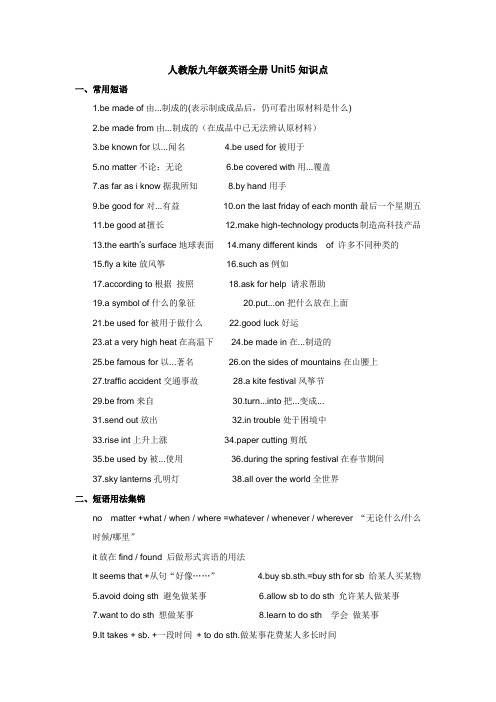
人教版九年级英语全册Unit5知识点一、常用短语1.be made of由...制成的(表示制成成品后,仍可看出原材料是什么)2.be made from由...制成的(在成品中已无法辨认原材料)3.be known for以...闻名4.be used for被用于5.no matter不论;无论6.be covered with用...覆盖7.as far as i know据我所知8.by hand用手9.be good for对...有益10.on the last friday of each month最后一个星期五11.be good at擅长12.make high-technology products制造高科技产品13.the earth’s surface地球表面14.many different kinds of 许多不同种类的15.fly a kite放风筝16.such as例如17.according to根据按照18.ask for help 请求帮助19.a symbol of什么的象征20.put...on把什么放在上面21.be used for被用于做什么22.good luck好运23.at a very high heat在高温下24.be made in在...制造的25.be famous for以...著名26.on the sides of mountains在山腰上27.traffic accident交通事故28.a kite festival风筝节29.be from来自30.turn...into把...变成...31.send out放出32.in trouble处于困境中33.rise int上升上涨34.paper cutting剪纸35.be used by被...使用36.during the spring festival在春节期间37.sky lanterns孔明灯38.all over the world全世界二、短语用法集锦no matter +what / when / where =whatever / whenever / wherever “无论什么/什么时候/哪里”it放在find / found 后做形式宾语的用法It seems that +从句“好像……” 4.buy sb.sth.=buy sth for sb 给某人买某物5.avoid doing sth 避免做某事6.allow sb to do sth 允许某人做某事7.want to do sth 想做某事8.learn to do sth 学会做某事9.It takes + sb. +一段时间+ to do sth.做某事花费某人多长时间10.try to do sth 尽力做某事10.辨析:be made of 由...制作/制造(材料):在成品中能看出原材料be made from由...制造/制成(材料):在成品中看不出原材料be made in在...制作/制造 (产地) Made in China.中国制造例:The desk is made of wood. Bread is made of flour.The paper is made from wood. Wine is made of grapes.This kind of plane is made in China.11. be famous for 以...闻名;为人知晓be known for因...而闻名be famous as作为...而闻名be known as作为...而闻名例:Jingdezhen is famous for china.China is famous for its tourism.Mo Yan is very famous as a writer.12. allow sb to do sth允许某人做某事allow doing sthbe allowed to do sth例:Please allow me to come in.My boss doesn't allow me to use the telephone.We were not allowed to talk in class.They allowed smoking in this room only.注意:allow只可搭配动名词短语作宾语,不可直接搭用动词不定式作宾补,即只可说allow doing sth,不可说allow to do sth.13.一般现在时的被动语态(见P155页)结构:am/is/are+过去分词。
人教版九年级英语Unit5知识点总结
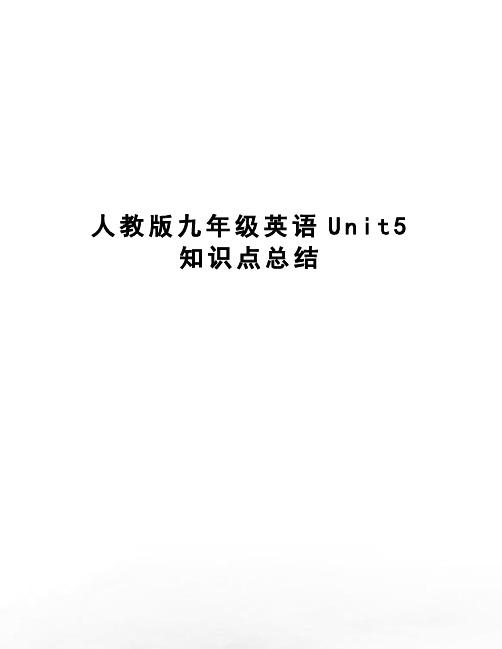
人教版九年级英语U n i t5知识点总结Unit5 Section A 1a-2d 知识提纲一、词形转换n. 环境→ adj. environmental 自然环境的,有关环境的n. 叶,叶子→复数(pl.)leaves3 wide adj. 宽的,宽阔的→adv. widely 广泛地,普遍地二、短语1. be known for 以……闻名,= be famous for made of 由……制成3. be made from 由……制成4. be made in + 地点产于某地5. all over the world 全世界6. by hand 手工地7. be good for 对……有益8. on the side of the mountains 在山边上三、词法和句法made of“由…制成”主语为制成品 of 后接原材料,制成品能看见原材料。
be made from“由…制成”主语为制成品from后接原材料,成品看不见原材料。
be made in + 地点某物产于某地The desk wood . 桌子是由木头做的。
Paper wood . 纸是由木材做的。
The kind of watch Shanghai .这种手表产于上海。
2.as far as I know 据我所知据我所知,李先生已经去美国了。
I know , Mr. Li has gone to America.3. both … and ………和……都……,不但……而且……连接主语时,动词为复数。
not only … but also…不但……而且……连接主语时,动词就近原则。
either …or…或者……或者……连接主语时,动词就近原则。
neither…nor…既不……也不……连接主语时,动词就近原则。
Tom Jack know my address . They often drop by my home ., but B. Both , and C. Either , or D. Not only , but also4. It seems that ………似乎……seem + adj. / seem to do sthIt seems that he is going to leave here . 似乎他要离开这里。
人教版英语九年级全一册第五单元知识点整理

九Unit5 What are the shirts made of?P331. Do you think this ring looks good?---Hmm…yes, I think it’s quite pretty. Is it made of silver?---Yes, and it was made in Thailand. quite 相当副词修饰形容词辨析:1. be made of 用……制造(指原材料没有发生化学上的变化)/ (a material) 表示用某种材料制成,物理变化。
eg. The teapot is made of silver.2.be made from 用……制造(指原材料发生化学上的变化,看不出原材料)/ 表示数种材料制成。
eg. Glass is made from sand and lime(石灰).3.be made by+人由谁制造的eg. This shelf was made by my grandpa.4.be made in +产地在……制造eg. The violin was made in Germany.5.be made up of 由……组成,由……构成eg. This club is made up of more than more than 200 members。
被动语态:主动语态强调人,被动语态强调事。
结构:be done be动词用来体现时态,done过去分词,用来体现被动一现:am/is/are done 一过was/were done 一将:will be done 现进:am/is/are being done 现完:have/has been done 含有情态动词:must be done 动词不定式:to be done v-ing 被动:being doneP34 1. China is famous for tea, right?A. be famous for……因……而闻名=be known for 以……闻名B. be famous as 作为……而出名;作为……而闻名The area is famous as a green tea producing place.C. be famous to 为……所熟知eg. They may not be famous to the general public.2.How is tea produced? Well, as far as I know, tea plants are grown on the sides of mountains. When the leaves are ready, they are picked by hand and then are sent for processing. be done 被动结构3.People say that tea is good for both health and business.连词:both…and………和……两个都a. 构成短语做主语是,谓语复数b. 否定句是部分否定He can't play both the violin and the piano.c. 所连接的前后两部分的成分必须一致其他并列连词:You are right. I am right.Either you or I am right.(就近原则)He plays soccer. He plays basketball.He plays either soccer or basketball.①either…or…或……或……不是……就是……a. 由either…or…构成的短语做主语时,谓语动词随其临近的词,即or后的词而定(就近原则)b. or 前后词性必须一致I don't like beef. I don't like lamb, either.I like neither beef nor lamb.He isn't right. I am not right.Neither he nor I am right.or Neither I nor he is right.②neither… nor… 既不……也不a. 由neither…nor…构成的短语作主语时,谓语动词随其临近的词,即nor后的词(近后原则)b. neither …nor… 本身是全否定,故不再用否定,即不再加notc. nor 前后的词性必须一致You must wash the dishes. You must sweep the floor.You must not only wash the dishes but sweep the floor as well.③not only…but also…not only…but … as well 不但…而且…a.连接对等的词或词组b. 连接的短语作主语时,谓语动词随but also/but 后面的词而定(就近原则)be good for 对……有益eg. Herb tea is good for your health.be good with 善于应付……的eg. She is good with kids.be good to 对……友好eg. My grandmother is good to me.be good at =do well in 擅长eg. I am good at learning new knowledge.P35 1. He found it interesting that so many products in the local shops were madein China. it 形式宾语,that从句真正的宾语2.But I had to visit five or six stores before finding a pair made in America! had to 表示过去不得不before+动名词这个结构相当于一个时间状语从句,表示动作的先后顺序可以用after, before; on+动名词通常表示两个动作几乎同时发生。
九年级英语人教版第五单元知识点汇总

九年级英语人教版第五单元知识点汇总一、句型1.一般现在时的被动语态:承受者+be (is/am/are)+done(过去分词) by+执行者 .练习1. The brown desk ____________(make) of wood.2. I _____________ (ask) to clean my bedroom every day by my mother.3. Trees _____________ (plant) in spring.4. ----How clean and tidy your bedroom is!----Thank you. It _____________(clean) every day.5. Usually computers ______________(use) to get information on the Internet.6. As China grows stronger and stronger ,Chinese ____________(teach) in more and more schools out of our country.7. A book ____________(give) to me by my mother on my birthdays.8. Flowers ___________( water ) by Mike every day.9. They ___________( hear ) to sing songs by Tom next room.10. It ____________(say) that Slumdog Millionaire is a good film.2. He found it interesting that so many products in the local shops were made in China.(it在此处是形式宾语,指代that从句)二、短语1. be made of …由… 制成(可以看出原材料,组成较简单)be made from… 由… 制成(看不出原材料,组成较复杂)be made by sb 由某人制作be made in swh 由某地制造be made into… 制成… Wood can be made into desks.2. environmental protection 环保protect environment 保护环境3. in the past 在过去in the future 在将来at present = now 在现在4. on the side of … 在… 的一侧by the side of… 在… 的旁边5. all over \ around \ across the world 全世界;世界各地6. no matter what 无论什么(只能放到句首,引导让步状语从句)whatever 无论什么(可引导名词性从句,当引导让步状语从句时等于no matter what)7. be famous \ known for… 因…而著名be famous \ known as… 作为… 而著名be famous \ known to… 对某人来说…很著名8. as far as I know 据我所知9. by hand 手工10. be good for 对… 有好处be good to 善待某人be good at 擅长be good with 善于和某人打交道11. avoid doing 避免做某事12. have a traffic accident 出了一起交通事故13. mobile phone 手机14. make a kite 做风筝fly a kite 放风筝15. turn … into… = change … into … 把… 变成…16. according to 根据;按照17. in trouble 在遇到麻烦/困难的时候in need 在紧急关头,在需要的时候18. at a very high heat 以高温;在高温下19. paper cutting 剪纸sky lanterns 孔明灯clay art 陶瓷艺术20. fairy tale 童话故事21. be used for + doing = be used to + do 用于做be used to doing 习惯于做used to do 过去常做22. in style 时尚的out of style 过时的23. at midnight 在半夜24. classic films 经典影片25. a lot of research on… 关于… 的大量研究26. be covered with 被… 覆盖三、辨析1. produce、make和growproduce可以表示生产汽车、机器,也可以表示生产粮食蔬菜make制造,主要指制造工业品,不能表示通过种植而获得的产品,强调原材料的再加工grow 主要指种植、栽培庄稼,农产品2. German GermanyGermany n. 德国German n. 德语;德国人(复数:Germans)adj. 德国的3. for example such as 例如;比如for example 后接逗号,常举一个实例。
人教版九年级英语u5知识点总结

人教版九年级英语u5知识点总结第一部分:单词与短语1. challenge (n.) - 挑战;challenge (v.) - 向...挑战2. adventure (n.) - 冒险;adventurous (adj.) - 喜爱冒险的3. determined (adj.) - 决心的;determination (n.) - 决心4. overcome (v.) - 克服;overcoming (n.) - 克服困难5. hesitate (v.) - 犹豫;hesitation (n.) - 犹豫6. compete (v.) - 竞争;competition (n.) - 竞赛7. reward (n.) - 奖励;reward (v.) - 奖励8. accomplish (v.) - 完成;accomplishment (n.) - 成就9. inspire (v.) - 鼓舞;inspiration (n.) - 鼓舞人心的事物10. talented (adj.) - 有才华的;talent (n.) - 才艺第二部分:语法1. The use of reflexive pronouns:- Singular: myself, yourself, himself, herself, itself- Plural: ourselves, yourselves, themselvesExample: I bought a new book for myself.2. The use of infinitives and gerunds:- Infinitive (to + verb) is used as a noun, adjective, or adverb. Example: To swim is my hobby.- Gerund (verb + -ing) is used as a noun. Example: Swimming is good for health.3. The use of modal verbs:- Can, could, may, might, shall, should, will, would, mustExample: You can eat whatever you want.4. The use of relative pronouns:- Who (for people), which (for things), that (for both)Example: The girl who won the competition is my best friend.第三部分:阅读理解阅读理解是英语学习中的重要环节,九年级英语U5也有相关的阅读理解练习。
人教版九年级英语第五单元知识点

人教版九年级英语第五单元知识点第一部分:词汇1. 常见动词短语:- take out 拿出- give up 放弃- cheer up 高兴起来- look after 照顾- set off 出发2. 常见名词短语:- high school 中学- main character 主要角色- science fiction 科幻小说- foreign country 外国3. 常见形容词和副词:- fantastic 极好的- incredible 难以置信的- unusual 不寻常的- absolutely 绝对地- eventually 最终第二部分:语法1. 祈使句:- 祈使句是用来表示命令、请求、建议或劝告的句子。
- 构成:动词原形(用于一般句子)、动词原形 + not(用于否定句)。
- 例句:Sit down and listen.(请坐下来听。
)2. 第一、第二和第三人称:- 第一人称:表示说话人自己,使用"I"或"We"作为主语。
- 第二人称:表示对话的对象,使用"You"作为主语。
- 第三人称:表示与说话人和对象无关的其他人或物,使用"He/She/It/They"作为主语。
- 例句:I like playing basketball.(我喜欢打篮球。
)3. 特殊疑问句:- 用于询问具体信息的句子。
- 构成:疑问词(who, what, where, when, why, how等) + 一般疑问句结构。
- 例句:What time is it now?(现在几点了?)第三部分:阅读理解阅读下面的短文,根据短文内容,选择正确答案。
(A)Tom is a middle school student. He usually gets up at six o'clock in the morning and has breakfast at home. Then he goes to school by subway. He is good at English, and he likes playing basketball. Afterschool, he often goes to the school basketball club and plays basketball with his friends. His favorite food is pizza. He doesn't like doing homework, but he studies hard for his exams.1. What time does Tom get up in the morning?A. At five o'clock.B. At six o'clock.C. At seven o'clock.2. How does Tom go to school?A. By subway.B. By bus.C. By bike.3. What is Tom good at?A. Chinese.B. English.C. Math.4. What does Tom like doing after school?A. Playing basketball.B. Playing soccer.C. Playing tennis.5. What is Tom's favorite food?A. Pizza.B. Hamburger.C. French fries.(B)请根据下面的文章内容,回答问题。
人教版九年级英语unit5知识点
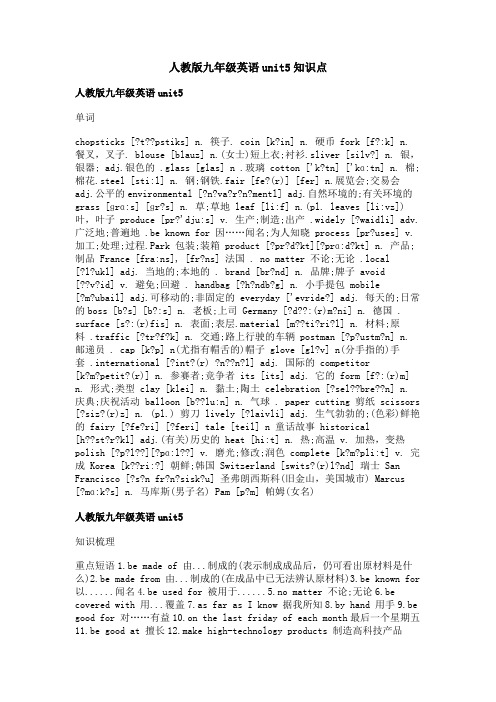
人教版九年级英语unit5知识点人教版九年级英语unit5单词chopsticks [?t??pstiks] n. 筷子. coin [k?in] n. 硬币 fork [f?:k] n. 餐叉,叉子. blouse [blauz] n.(女士)短上衣;衬衫.sliver [silv?] n. 银,银器; adj.银色的 .glass [glas] n .玻璃 cotton ['k?tn] ['kɑ:tn] n. 棉;棉花.steel [sti:l] n. 钢;钢铁.fair [fe?(r)] [fer] n.展览会;交易会adj.公平的environmental [?n?va?r?n?mentl] adj.自然环境的;有关环境的grass [ɡrɑ:s] [ɡr?s] n. 草;草地 leaf [li:f] n.(pl. leaves [li:vz])叶,叶子 produce [pr?'dju:s] v. 生产;制造;出产 .widely [?waidli] adv. 广泛地;普遍地 .be known for 因……闻名;为人知晓 process [pr?uses] v. 加工;处理;过程.Park 包装;装箱 product [?pr?d?kt][?prɑ:d?kt] n. 产品;制品 France [fra:ns], [fr?ns] 法国 . no matter 不论;无论 .local[?l?ukl] adj. 当地的;本地的 . brand [br?nd] n. 品牌;牌子 avoid[??v?id] v. 避免;回避 . handbag [?h?ndb?g] n. 小手提包 mobile[?m?ubail] adj.可移动的;非固定的 everyday ['evride?] adj. 每天的;日常的boss [b?s] [b?:s] n. 老板;上司 Germany [?d??:(r)m?ni] n. 德国 . surface [s?:(r)fis] n. 表面;表层.material [m??ti?ri?l] n. 材料;原料 .traffic [?tr?f?k] n. 交通;路上行驶的车辆 postman [?p?ustm?n] n. 邮递员 . cap [k?p] n(尤指有帽舌的)帽子 glove [gl?v] n(分手指的)手套 .international [?int?(r) ?n??n?l] adj. 国际的 competitor[k?m?petit?(r)] n. 参赛者;竞争者 its [its] adj. 它的 form [f?:(r)m] n. 形式;类型 clay [klei] n. 黏土;陶土 celebration [?sel??bre??n] n. 庆典;庆祝活动 balloon [b??lu:n] n. 气球 . paper cutting 剪纸 scissors [?siz?(r)z] n. (pl.) 剪刀 lively [?laivli] adj. 生气勃勃的;(色彩)鲜艳的 fairy [?fe?ri] [?feri] tale [teil] n 童话故事 historical[h??st?r?kl] adj.(有关)历史的 heat [hi:t] n. 热;高温 v. 加热,变热polish [?p?l??][?pɑ:l??] v. 磨光;修改;润色 complete [k?m?pli:t] v. 完成 Korea [k??ri:?] 朝鲜;韩国 Switzerland [swits?(r)l?nd] 瑞士 San Francisco [?s?n fr?n?sisk?u] 圣弗朗西斯科(旧金山,美国城市) Marcus [?mɑ:k?s] n. 马库斯(男子名) Pam [p?m] 帕姆(女名)人教版九年级英语unit5知识梳理重点短语1.be made of 由...制成的(表示制成成品后,仍可看出原材料是什么)2.be made from 由...制成的(在成品中已无法辨认原材料)3.be known for 以......闻名4.be used for 被用于......5.no matter 不论;无论6.be covered with 用...覆盖7.as far as I know 据我所知8.by hand 用手9.be good for 对……有益10.on the last friday of each month最后一个星期五11.be good at 擅长12.make high-technology products 制造高科技产品13.the earth’s surfac e 地球表面14.many different kinds of 许多不同种类的15.fly a kite 放风筝16.such as 例如17.according to 根据按照18.ask for help 请求帮助19.a symbol of ……的象征20.put…on… 把……放在……上21.be used for 被用于做……22.good luck 好运23.at a very high heat 在高温下24.be made in 在……制造的25.be famous for 以……著名26.on the sides of mountains 在山腰上27.traffic accident 交通事故28.a kite festival 风筝节29.be from 来自30.turn ……into ……把……变成……重点句型1. What are the shirts made of?衬衫是由什么制成的?2. It was made in Thailand.它是在泰国制造的。
- 1、下载文档前请自行甄别文档内容的完整性,平台不提供额外的编辑、内容补充、找答案等附加服务。
- 2、"仅部分预览"的文档,不可在线预览部分如存在完整性等问题,可反馈申请退款(可完整预览的文档不适用该条件!)。
- 3、如文档侵犯您的权益,请联系客服反馈,我们会尽快为您处理(人工客服工作时间:9:00-18:30)。
人教版九年级英语第五单元知识点总结Unit 5 What are the shirts made of一.chopsticks /coin/ fork /blouse/ silver /glass/ cotton/ steel/ fair/ environmental /grass /leaf/ produce /widely /process /be known for/ pack/ product/ France/ no matter/ local/ brand/ avoid/ handbag/ mobile /everyday/ boss /Germany/ surface/ material/ traffic/ postman/ cap/ glove/ international/ competitor/ its /form/ clay /celebration/ balloon/ paper cutting /scissors lively /fairy/ historical/ heat/ polish /completeStudents clean the classroom every day.The classroom is cleaned by students every day.The classroom isn’t cleaned by students every dayIs the classroom cleaned by students every day?When is the classroom cleaned by students every day?二.1. produce v. 生产;制造produce、make和grow的用法1).produce 可车、机器 produce cars生产汽车也可以表示生产粮食蔬菜 produce wheat生产小麦2).make 制造,工业品 make cars制造汽车、飞机不能表示通过种植而获得的产品,不能说make wheat3).grow 主要指种植、栽培庄稼,农产品grow wheat种小麦Many of us knw to ____tea, but few knows where tea trees are_____.A. make, madeB. grow, grownC. produce, madeD. make, grown根据题意可知,第一空“是怎样泡茶”make tea ;第二空是“种茶树”grow tea trees2. German Germans Germany3. lively1)live “活着的”,通常指物,不指人,常用来作定语放名词的前面。
还指“实况转播的”。
例如:a live fish 一条活鱼。
Do you like a live show or a recorded show ?2)living意为“活着”强调说明“尚在人间”,“健在”,可用来指人或物,作定语或表语。
例如:.My first teacher is still living . English is a living language .A living language should be learned through listening and speaking .He is regarded as one of the best living writers at present .注意:living 前加上 the , 表示类别,指“活着的人们”。
例如:The living must finish the work of those dead .living 还可用于短语,例如:make a living 谋生。
3)alive 意为“活着”,侧重说明生与死之间的界限(本来会死但没有死),既可指人,也可指物;可用来作表语,后置定语或宾补。
例如:The badly wounded soldier was still alive when he was taken to the hospital .He is dead , but his dog is still alive . He wanted to keep the fish alive . This is a fish alive.4)lively 则意为“活泼的”,“活跃”,“充满生气的”,可作定语、表语或宾补,既可指人,又可指物。
例如:Jenny is a lively girl . Everything is lively here . 这儿一切都生机勃勃。
He had a strange way of making his classes lively and interesting .4. avoid +doing5. be made of/ be made from/be made by/ be made into/be made in/be made up of 由…构成或组成的。
Our class is made up of six groups.6. be known/famous/well-known for be known/famous/well-known asbe known/famous/well-known in be known/famous/well-known to7. be good (bad) for/be good to/be good with/be good at(do well in)both.. and… / andThe teacher and the writer are coming.The teacher and writer is coming.Both you and I are good students.not only…but (also)…/neither…nor/either…oras well as/more than/with/together with/along with/like/except/besides/includingevery/each/no/no one/some(any ,no, every)+body(one/thing)主语或主语限定词分数+of +n由分数后的名词单复数决定half of the apple/half of the apples5. seem to do sth =It seems that…看起来似乎They seem to find the way to the cinema. =It seems that they find the way to the cinema.6.turn up/turn down /turn on/turn off/turn into = change intoturn to 转向;翻到(某页) ;求教于; turn around7. find意为“找到、发现”,通常指找到或发现具体的东西,也可指偶然发现某物或某种情况,强调的是找的结果。
look for意为“寻找”,是有目的地找,强调“寻找”这一动作。
find out意为“找出、发现、查明”,多指通过调查、打听、研究之后“搞清楚、弄明白”,通常含有“经过困难曲折”的含义,指找出较难找到的、无形的、抽象的东西The police is visiting the neighborhood and trying to ____the truth of the fact.A. look forB. searchC. findD. find out8. no matter +whaen / wh ere =whatever / whenever / wherever “无论什么/什么时候/哪里”9. glass指玻璃时为不可数名词,指玻璃杯时为可数名词,指眼镜时必为复数(多以a pair of修饰)为形容词,每日的,every day多做状语,每天think/believe it adj. to do12. all/different kinds of各种各样的 a kind of一种 kind of有点(=a little/bit)seen as = be regarded as=be treated as被视作example/such as15.四个“花费”句型16.过去分词做后置定语 a boy called Lilei= a boy named Lilei17. scissors n 剪刀(常用作复数,作主语时谓语用复数)a pair of scissors 一把剪刀成双成对的名词只有复数形式,类似的词还要:jeans 牛仔裤 trousers裤子 shorts 短裤 glasses眼镜 shoes鞋“a pair of +复数名词”做主语时,谓语动词与pair的形式一致。
This ___________ is made of metal and plastic.A. pair of scissorsB. scissorsC. piece of scissors打包;一包 a pack of eg: I bought a pack of gum.(牙签)compete v-competitor n compete with sbcomplete v+ doing;18.全世界(3)即使(4)由...制成的(表示制成成品后,仍可看出原材料是什么)/由...制成的(在成品中已无法辨认原材料)/在......制造/由…制造/被制成…./被…制造/由…组成/在......生产/因...闻名/作为…而闻名/在…闻名/为…知晓/被用于...(2)/不论/据我所知/用手采摘/对……有益/擅长/对…友好/对…相处融洽/在每个月的最后一个星期五/制造高科技产品/在地球表面/许多不同种类的/ 例如/根据,按照/作为……的象征/张贴/好运/在高温下/ 在山腰上/在…边上/造成交通事故/把……变成……/处于困境中/上升, 上涨/剪纸/在春节期间/孔明灯/尽力做某事 /环境保护 /派人去请/避免做某事 /日常用品 /查明;弄清 /去度假/ 发出(光亮,声音);放出;生出 /童话故事/一幅美丽的画/覆盖(3)/传统艺术的特殊形式/在周围,存在/热气球/中国陶土艺术/陶土作品/历史故事/飞机模型/不仅在过去还在现在/他们自己的/被看作是(3)/地下停车场 /关于…的研究/例如(2)/艺术与科学展览会/事实上/放风筝/幸福的光明象征/被送去加工/一个17岁学生 /美国品牌/好运/被画上.../精美物品19-裙子(酒)是由什么制成的?在哪儿被制成的?由谁制成的?-是由丝绸制成的。
